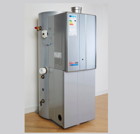Rinnai Infinity goes Solo

The Rinnai Infinity Solo range is an efficient heavy-duty gas-fired recirculatory water heater with an insulated stainless steel storage cylinder.
The combination of continuous flow units with a storage cylinder for pre-heated hot water allows for periods of peak hour use. This is important at sites where limited gas services may dictate the use of water heating systems.
Rinnai’s Infinity Solo low NOX water heaters can be used for the ‘direct to outlet’ system, and secondary return systems. Infinity Solo delivers a constant output temperature of 60°C or higher, ensuring stored water is at levels that significantly reduce any risk of legionella proliferation.
The design parameters of this product - all in one compact footprint – offer many benefits for today’s designers and installers. For instance, the Infinity Solo has heat engines of 35k, 37kW and 54kW sizes, ensuring sites with a smaller gas meter can use this technology.
The larger Infinity Solo model will also act as a high-efficiency alternative to gas fired storage appliances that still exist in today’s market and can be easily installed on a like-for-like basis where plant room services are concerned.
One other benefit of the Infinity Solo using a stainless-steel cylinder is that the life expectancy of the material is far greater than that of a glass-lined equivalent.








